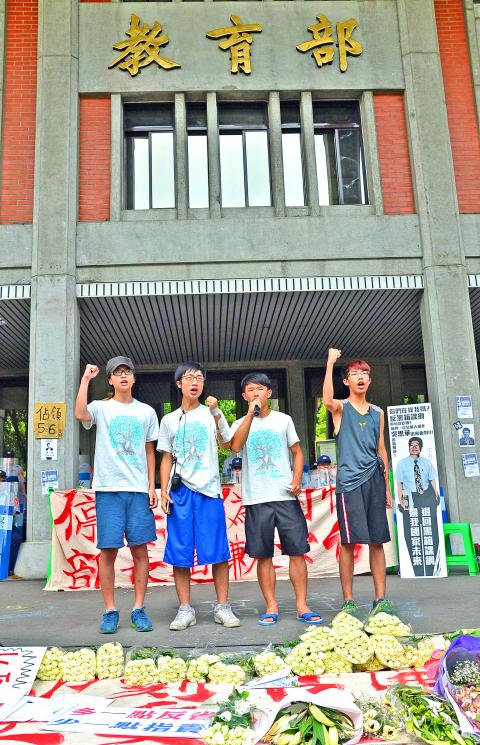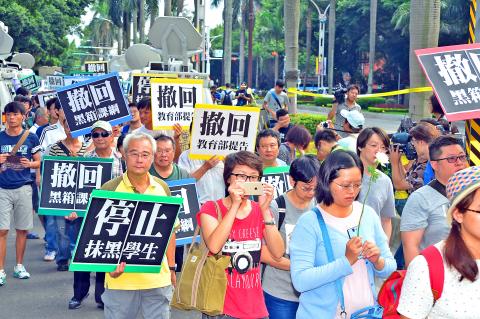A potential solution to the great divide between the Ministry of Education and the student protesters occupying the ministry to protest against controversial high-school curriculum guidelines might be in the making, as former National Taichung First Senior High School dean Tsai Ping-kun (蔡炳坤) attempted to mediate a deal yesterday.
Consensus was reached at 10pm last night that Minister of Education Wu Se-hwa (吳思華) would meet with representatives of the student protesters this afternoon to attempt to reconcile their differences.
Chu Chen (朱震), convener of the Northern Taiwan Anti-Curriculum Changes Alliance, said that he, alliance spokesman Wang Pin-chen (王品蓁), four other student members and Taichung First Senior High School student Liao Chung-lun (廖崇倫), former spokesman of the Apple Tree Commune student club, which started the debate against the controversial curriculum guideline adjustments, would attend the meeting. Three teachers are also to accompany them to the meeting.

Photo: Wang Yi-sung, Taipei Times
According to Ministry of Education Secretary-General Wang Chun-chuan (王俊權) the meeting could be transmitted live online and the ministry would arrange a news conference afterward.
A number of protesters, mainly high-school students, entered the ministry compound early on Friday during a demonstration against the controversial high-school textbook guideline adjustments, which went into effect on Saturday. The student occupation of the plaza inside the ministry gates yesterday surpassed 60 hours.
The students have demanded that Wu resign, that the implementation of the new guidelines be halted and an extra legislative session to review the changes.

Photo: Wang Yi-sung, Taipei Times
A number of civic groups yesterday afternoon staged a march around the perimeter of the building in support of the students.
Earlier yesterday, the presidents of five private universities called for the students to withdraw as soon as possible and begin a rational dialogue with the ministry.
Samuel Chang (張光正), of Chung Yuan Christian University, read the announcement at a news conference, saying the group understood the objectives of the students’ protest and approved of their ideals, but condemned any unlawful and disorderly activity, and hoped the issue could be discussed in a rational manner.
The group of university presidents also said they were apprehensive the radical approaches of some students might set a bad example, expressing concern the issue could make Taiwanese society more confrontational and impair the nation’s competitiveness in the future. They called on the ministry to invite professionals, experts and student representatives to build a dialogue and find a solution, while urging the students to end their protest and withdraw from the premises.
The statement was signed by Chang and his counterparts at Tatung University, Chinese Culture University, Shih Chien University and the Taipei-based China University of Technology, as well as 10 academics.
In response, the student protesters released their own statement, saying: “We all want to return to our normal lives, but [they] should return normal textbook guidelines to us first.”

SECURITY: As China is ‘reshaping’ Hong Kong’s population, Taiwan must raise the eligibility threshold for applications from Hong Kongers, Chiu Chui-cheng said When Hong Kong and Macau citizens apply for residency in Taiwan, it would be under a new category that includes a “national security observation period,” Mainland Affairs Council (MAC) Minister Chiu Chui-cheng (邱垂正) said yesterday. President William Lai (賴清德) on March 13 announced 17 strategies to counter China’s aggression toward Taiwan, including incorporating national security considerations into the review process for residency applications from Hong Kong and Macau citizens. The situation in Hong Kong is constantly changing, Chiu said to media yesterday on the sidelines of the Taipei Technology Run hosted by the Taipei Neihu Technology Park Development Association. With

CARROT AND STICK: While unrelenting in its military threats, China attracted nearly 40,000 Taiwanese to over 400 business events last year Nearly 40,000 Taiwanese last year joined industry events in China, such as conferences and trade fairs, supported by the Chinese government, a study showed yesterday, as Beijing ramps up a charm offensive toward Taipei alongside military pressure. China has long taken a carrot-and-stick approach to Taiwan, threatening it with the prospect of military action while reaching out to those it believes are amenable to Beijing’s point of view. Taiwanese security officials are wary of what they see as Beijing’s influence campaigns to sway public opinion after Taipei and Beijing gradually resumed travel links halted by the COVID-19 pandemic, but the scale of

A US Marine Corps regiment equipped with Naval Strike Missiles (NSM) is set to participate in the upcoming Balikatan 25 exercise in the Luzon Strait, marking the system’s first-ever deployment in the Philippines. US and Philippine officials have separately confirmed that the Navy Marine Expeditionary Ship Interdiction System (NMESIS) — the mobile launch platform for the Naval Strike Missile — would take part in the joint exercise. The missiles are being deployed to “a strategic first island chain chokepoint” in the waters between Taiwan proper and the Philippines, US-based Naval News reported. “The Luzon Strait and Bashi Channel represent a critical access

Pope Francis is be laid to rest on Saturday after lying in state for three days in St Peter’s Basilica, where the faithful are expected to flock to pay their respects to history’s first Latin American pontiff. The cardinals met yesterday in the Vatican’s synod hall to chart the next steps before a conclave begins to choose Francis’ successor, as condolences poured in from around the world. According to current norms, the conclave must begin between May 5 and 10. The cardinals set the funeral for Saturday at 10am in St Peter’s Square, to be celebrated by the dean of the College